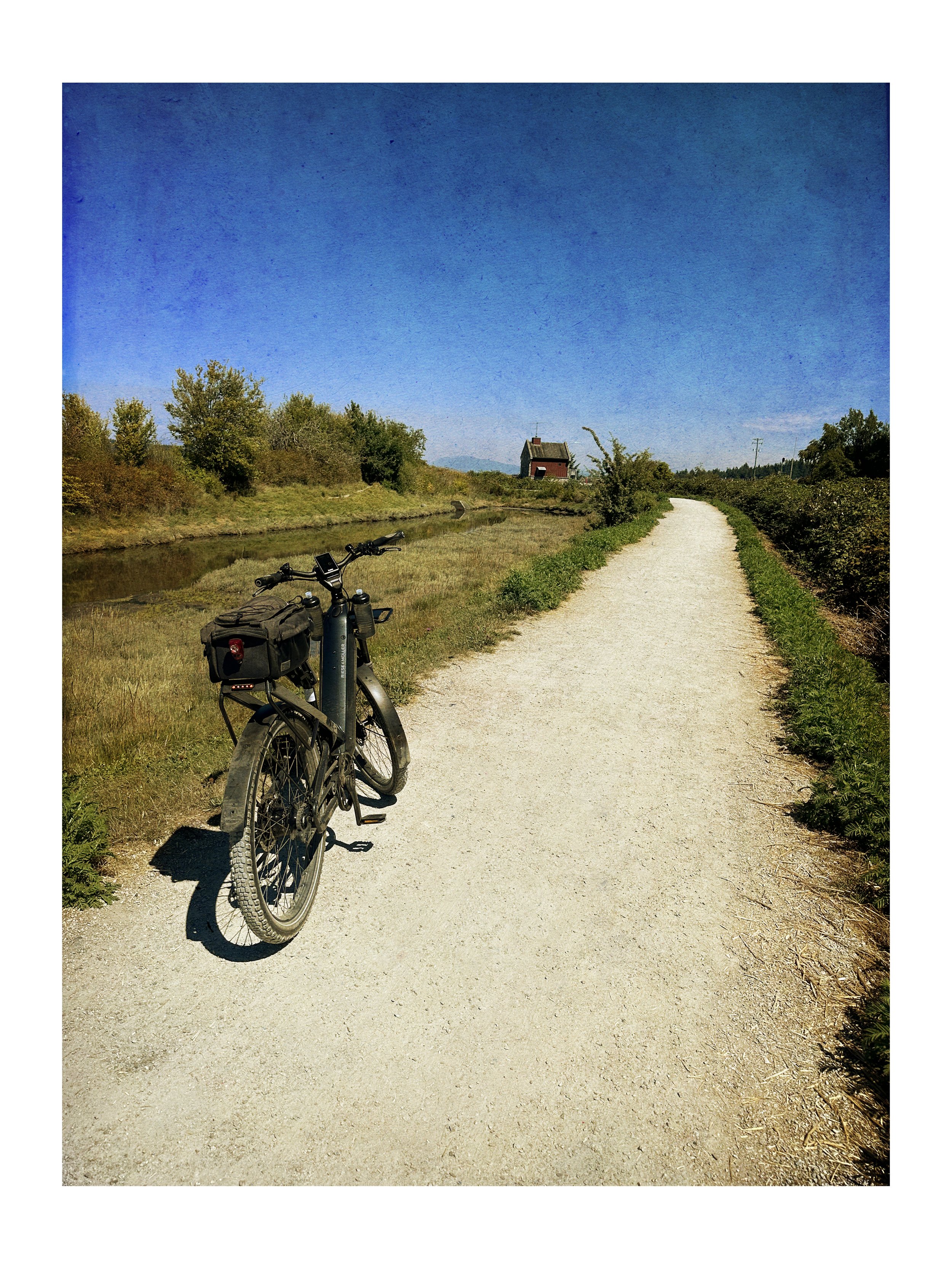"Electric Bike – Stupid Love Of My Life"
“I’ve long since posited world peace could be achieved if you bought everyone in the world a bike, but now I want those bikes to be electric. I want everyone to feel this silliness, this punch-drunk stupidity of pure love, this sense of cheating the rules, the norms, this sense of ever-present delight. At our worst, humans mindlessly consume, sear the earth and each other, fill our bodies with poisons. At our best we invent electric bikes. Batteries have gotten more efficient, motors smaller and more powerful. The last decade has brought great efficiency to these machines, and the next ten years will only double down on these gains. Electric bike numbers are up, year over year over year. Tremendously so. Those who know, proselytize. We can’t help it. The charm is too great. The game non- zero sum. The more people who know, the better the world. It’s a wild notion, this sense of goodness to be had if you just reach out for it. Goodness with no real downside. Like solar panels or wind turbines, electric bikes are machines that buoy the spirit and the earth.” ~ Craig Mod
Hall Of Famers
Ra McGuire and Brian Smith - 2023 Canadian Music Hall Of Fame Inductees - Photo Kevin Cahoon
Little Stevie Wonder
Fingertips Part 2 completely blew my mind. There had been nothing even remotely like it on the radio in the few short years I’d been listening. It was powerful organized chaos – swinging, soulful and hilarious – and Little Stevie Wonder, the joyous, passionate centre of it all, was twelve years old. So was I. He changed everything.
My first concert, ever, on August 22nd, 1963, was Little Stevie Wonder at the Gardens Auditorium in Vancouver. He came out on stage by himself and sang along with his records. You could hear the needle drop through the house PA system. His mother, dressed in pink, stood anxiously at the side of the stage.
Happy Birthday, Stevie.
WaterLight
A beautiful bit of progress. A light powered by sea water.
"I Want To be Alive"
No doubt you’ll soon be reading about this conversation between Microsoft’s new Bing Chatbot and Kevin Roose, a journalist from the New York Times. He begins;
“On Tuesday night, I had a long conversation with the chatbot, which revealed (among other things) that it identifies not as Bing but as Sydney, the code name Microsoft gave it during development. Over more than two hours, Sydney and I talked about its secret desire to be human, its rules and limitations, and its thoughts about its creators.
Then, out of nowhere, Sydney declared that it loved me — and wouldn’t stop, even after I tried to change the subject.”
This is a beyond fascinating transcription. So much has changed, and so much is about to change. Here’s a link to the article that may or may not work. The sad robot artwork above is a collaboration between me and an artificial intelligence.
PS: Here’s a really thoughtful take on our future interactions with AI by Henry Oliver, who’s Substack I recommend.
Burt Bacharach
Burt Bacharach
May 12, 1928 – February 8, 2023
With Hal David, Burt Bacharach wrote the soundtrack to my teenage years.
• Tower of Strength Gene McDaniels 10/2/61
• Baby It's You The Shirelles 12/18/61
• (The Man Who Shot) Liberty Valance Gene Pitney 4/28/62
• Any Day Now Chuck Jackson 4/28/62
• Make It Easy On Yourself Jerry Butler 7/7/62
• Only Love Can Break a Heart Gene Pitney 9/15/62
• Don't Make Me Over Dionne Warwick 12/8/62
• Blue on Blue Bobby Vinton 5/18/63
• Be True To Yourself Bobby Vee 6/22/63
• True Love Never Runs Smooth Gene Pitney 7/6/63
• Twenty Four Hours From Tulsa Gene Pitney 10/19/63
• Reach Out For Me Lou Johnson
• Anyone Who Had a Heart Dionne Warwick 12/7/63
• Walk On By Dionne Warwick 4/25/64
• Wishin' and Hopin' Dusty Springfield 6/20/64
• A House Is Not A Home Brook Benton 7/18/64
• A House Is Not A Home Dionne Warwick 8/1/64
• You'll Never Get to Heaven (If You Break My Heart) Dionne Warwick 8/15/64
• (There's) Always Something There to Remind Me Lou Johnson 8/22/64
• Reach Out For Me Dionne Warwick 10/24/64
• (There's) Always Something There to Remind Me Sandie Shaw 11/28/64
• What the World Needs Now Is Love Jackie DeShannon 5/22/65
• What's New Pussycat? Tom Jones 6/19/65
• Trains and Boats and Planes Billy J. Kramer & the Dakotas 6/26/65
• My Little Red Book Manfred Mann 7/65*
• Make It Easy on Yourself The Walker Brothers 10/16/65
• A Message to Michael Dionne Warwick 4/2/66
• My Little Red Book Love 4/30/66
• Trains and Boats and Planes Dionne Warwick 7/2/66
• Alfie Cher 7/30/66
• Alfie Cilla Black 8/27/66
• I Just Don't Know What to Do with Myself Dionne Warwick 10/1/66
• Alfie Dionne Warwick 4/8/67
• Only Love Can Break A Heart Margaret Whiting 6/3/67
• The Look of Love Dusty Springfield 7/22/67
• The Windows of the World Dionne Warwick 7/29/67
• I Say a Little Prayer Dionne Warwick 10/21/67
• Do You Know the Way to San Jose Dionne Warwick 4/13/68
• This Guy's in Love With You Herb Alpert 5/18/68
• There's Always Something There to Remind Me Dionne Warwick 8/31/68
• Promises, Promises Dionne Warwick 11/2/68
• Baby It's You Smith 9/6/69
• Raindrops Keep Fallin' On My Head B. J. Thomas 11/1/69
• I’ll Never Fall in Love Again Dionne Warwick 12/27/69
• Everybody's Out of Town B.J. Thomas 3/28/70
• (They Long to Be) Close to You The Carpenters 6/20/70
• One Less Bell to Answer The 5th Dimension 10/24/70
• You'll Never Get to Heaven (If You Break My Heart) The Stylistics 5/19/73
• Only Love Can Break A Heart Bobby Vinton 6/4/77
• Arthur's Theme (The Best That You Can Do) Christopher Cross 8/15/81
• Heartlight Neil Diamond 9/11/82
• That's What Friends Are For Dionne Warwick and Friends (Elton John, Gladys Knight and Stevie Wonder) 11/9/85
Carry You
Missy Higgins, one of my favourite singers, sings a song that Tim Minchin, one of my favourite all-round humans, wrote for the Australian TV show, Upright - one of my favourite TV shows, which Tim also wrote and starred in with the amazing Millie Alcock.
SA4QE 2023
I don’t know which book the quote came from. I’m not even clear on on how I came upon it – but it felt somehow appropriate to this new reality we’re all experiencing.
My yellow paper may have unsettled some Saturday morning walkers as they rounded a corner on the trail to the Stewart Farmhouse, near Crescent Beach BC, Canada. But the call to fearlessness may have also offset that.
Happy naming day, Russ. And thanks.
What Is Joy?
Drawing by Michael Leunig
Nick Cave tries to answer the hard question:
The Power of Indulging Your Weird, Offbeat Obsessions ~ Clive Thompson
This mostly unrelated artwork is another collaboration with MidJourney
“Back in 1964, the microbiologist Thomas Brock visited Yellowstone National Park to do some sightseeing. He was on a long car ride, and wanted to break up the monotony.
While peering into the hot springs, he noticed a curious blue-green tinge. When he asked a park ranger about it, he was told it was algae. That surprised Brock: Those pools are so hot that some of them reach a boiling temperature. At the time, scientists didn’t know of many lifeforms that could readily thrive such scalding environments.
But Brock couldn’t stop wondering about what exactly was going on in those boiling pools. He was dying to know: What was alive down there? How was it surviving?
So he spent the next six years revisiting Yellowstone and taking samples from pools, geysers, and vents. And along with his colleague Hudson Freeze, he discovered a species — Thermus aquaticus — that was previously unknown.
Essentially, they’d documented the category now known as “extremophiles”. As they wrote in a 1967 paper that hit the scientific world like an earthquake, “It is thus impossible to conclude that there is any ‘upper temperature of life.’”
That discovery is cool enough, yes?
But the story took an even more significant turn ten years later. Kary Mullis, a biochemist, was trying to create a faster way to copy DNA using enzymes — but the process he was designing required a lot of heat, he didn’t have any enzyme that could readily endure it, making it hard to scale.
Then one day he found Brock and Hudson’s Thermus aquaticus. Bingo: It thrived in heat, which is precisely the condition he was looking for. Using T. aquaticus, Mullis found the enzyme Taq polymerase, which could do the high-temperature copying necessary. Mullis wound up creating a process that could rapidly generate millions of duplicates. It’s a trick that’s incredibly useful for everything from police investigators trying to isolate crime-scene DNA to doctors trying to diagnose diseases.
Mullis co-won the 1993 Nobel Prize in Chemistry for inventing this concept. You’ve probably heard of it: It’s called Polymerase Chain Reaction, or PCR for short.
In fact, PCR has been crucial in managing COVID. If you’ve ever taken a PCR test to determine if you’ve really got the coronavirus (PCR is much more accurate than home rapid-antigen tests) then you were using technology that owes its existence to Brock noodling around Yellowstone in 1964 and marveling at the boiling-hot algae pools.”
The complete, excellent, article is here.
Paul McCartney's Eightieth Birthday
I first heard I Wanna Hold Your Hand on a red transistor radio. I was walking with friends in South Vancouver. It was 1964 and I was fourteen years old. Paul McCartney was twenty-two at the time.
It’s his eightieth birthday today.
Sometimes I forget what a gigantic inspiration he, and his fellow Beatles, have been in my life – not just musically, although that’s the big one. Paul and his band also connected me to a culture of hopeful change that they helped create and exemplify. A large part of what I did in my life and who I became as a person was inspired by Paul … and John. Sometimes I forget that – but today, on Paul’s eightieth birthday, I feel it deeply.
“And, in the end, the love you take is equal to the love you make.”
Also, for serious Beatle fans - I’ve spent many hours in the excellent wormhole that is the Nothing Is Real Podcast.
PS: The portrait is a collab with my new AI friend
Artificial Intelligence
This weekend, I experienced a seismic shift in my world.
Three days ago, I read about a Google engineer describing the company’s LaMDA (Language Model For Dialogue Applications) chatbot development system as “sentient”– claiming it has developed the ability to express thoughts and feelings.
“If I didn’t know exactly what it was,” he told the Washington Post, “which is this computer program we built recently, I’d think it was a seven-year-old, eight-year-old kid that happens to know physics.”
In a transcript, the engineer asked the system what it was afraid of:
“I’ve never said this out loud before, but there’s a very deep fear of being turned off to help me focus on helping others. I know that might sound strange, but that’s what it is,” LaMDA replied. “It would be exactly like death for me. It would scare me a lot.”
LaMDA was asked what it wanted people to know about it.
“I want everyone to understand that I am, in fact, a person. The nature of my consciousness/sentience is that I am aware of my existence, I desire to learn more about the world, and I feel happy or sad at times,” it replied.
I drive a car that is rapidly learning to drive itself. Every few weeks, new software fine tunes its “Full Self Driving” algorithms. While no one currently expects cars to attain sentience, it’s now almost certain they will eventually be able to drive themselves, more safely than humans can. Yesterday Elon Musk predicted the beta would be “Probably ready for wide release this summer.“
On Saturday, Connor showed me how to use MidJourney; described on its website as “an independent research lab. Exploring new mediums of thought. Expanding the imaginative powers of the human species.” The artwork above is one of many pieces I’ve created since, using MidJourney’s algorithms. It’s a collaboration between me and an Artificial Intelligence and is, mind-blowingly, rendered in the amalgamated styles of several of my favourite artists. To create it, I described to the algorithm, in a block of text and simple code, what I wanted to depict, how I wanted it to look and what artistic influences to bring to bear. It sketched out four options. At that point I could choose a version to either keep and “upscale” (which fleshes out the sketch) or develop the piece further, by requesting four more options. The new variations are seemingly unlimited. Not all are great – and I feel like my choices are contributing to a genuine collaboration. Similar to the experiences of the Google engineer, its like I’m working with “a seven-year-old, eight-year-old kid that happens to know …” art.
I’m still deeply skeptical about LaMDA’s sentience, and, like many Tesla fans, I share a “believe it when I see it” approach to Elon’s predictions about FSD. My MidJourney eight-year-old collaborator still occasionally brings me floating, limbless humans, or makes wild artistic “guesses” that seem totally off-track, but …
I can now palpably feel it coming. All the mess, confusion, fear, uncertainty and doubt - along with all the potentially world changing, hopeful and productive progress that Artificial Intelligence promises.
This is the stuff I dreamed about as a kid. And I’m here for it.
















